
|
GCOOS is the Gulf of Mexico regional component of the U.S. Integrated Ocean Observing System (IOOS). Our mission is to provide timely, reliable and accurate information on the open and coastal ocean waters of the Gulf of Mexico to ensure a healthy, clean, productive ocean and resilient coastal zone.
|
|
|
|
February 2017 - In This Issue:
|
|
|
|
|
Greetings!

February has been rolling along nicely, but March will be when things really start cooking here at GCOOS.
Right now, we're making plans for an early March visit to the Capitol to share information about the importance of coastal observation systems and tools to the nation and, especially, the Gulf states with our Congressional representatives.
We're also finalizing plans for our March 23 Members meeting in New Orleans.
We call it a Members meeting, but it really is open to all who are interested in learning more about GCOOS' ongoing programs and activities, hearing updates from some of our partners in the Gulf and meeting like-minded colleagues. We welcome Members and non-members alike. (See agenda highlights below.) I'm pleased to announce that our main speaker will be Dr. William Burnett of the
Navy Meteorology and Oceanography Command and that we'll have the opportunity to hear from
Carl Gouldman, new Director of the U.S. IOOS Program Office. Lunch is on us at the meeting, but please register your attendance by March 10, so that we may plan accordingly.
The March 3 deadline is also drawing near for you to make nominations to the GCOOS Board of Directors. If you're interested in working toward the expansion of the Gulf's observing system and supporting the GCOOS network, please consider nominating yourself for a position on the board. We're interested in expanding our applicant pool in all sectors -- public, private and nonprofit -- so think about joining us to make the system better for all!
Best regards,
|
|
|
Nadine Slimak, Public Relations & Content Marketing, Vetted Communications, LLC
|
|
|
We offer our condolences to the  family, friends and colleagues of Vembu Subramanian, Deputy Director, RCOOS and DMAC Operations for SECOORA, who died in a car accident on Jan. 24. Vembu was a founding member of SECOORA and often worked closely with our own data management and outreach and education teams here at GCOOS. To honor his commitment to teaching students about oceans, SECOORA is working to establish a student award/opportunity. family, friends and colleagues of Vembu Subramanian, Deputy Director, RCOOS and DMAC Operations for SECOORA, who died in a car accident on Jan. 24. Vembu was a founding member of SECOORA and often worked closely with our own data management and outreach and education teams here at GCOOS. To honor his commitment to teaching students about oceans, SECOORA is working to establish a student award/opportunity.
|
 We offer our best wishes to Zdenka Willis, Director of the U.S. IOOS Program Office since 2007, who retired at the end of January. Zdenka worked tirelessly to build partnerships with the federal agencies, regional associations, members of industry and international partners to transform U.S. IOOS from an emerging concept to a fully operational program that provides timely and reliable information to people around the nation and the world. Zdenka will continue to follow her passion for the ocean, coasts and Great Lakes as an independent consultant. We offer our best wishes to Zdenka Willis, Director of the U.S. IOOS Program Office since 2007, who retired at the end of January. Zdenka worked tirelessly to build partnerships with the federal agencies, regional associations, members of industry and international partners to transform U.S. IOOS from an emerging concept to a fully operational program that provides timely and reliable information to people around the nation and the world. Zdenka will continue to follow her passion for the ocean, coasts and Great Lakes as an independent consultant.
|
|
|
Get Your Board Nominations in Now: We Need You!
|
GCOOS' Membership Committee is seeking nominations for the organization's Board of Directors. People interested in and committed to working within an organization  dedicated to provide data, information and products to the Gulf of Mexico stakeholder community from all sectors -- governmental, NGO, industry and academia -- are invited to nominate themselves or a colleague. dedicated to provide data, information and products to the Gulf of Mexico stakeholder community from all sectors -- governmental, NGO, industry and academia -- are invited to nominate themselves or a colleague.
Learn more about Board service and how to make nominations.
- The nomination deadline is 5 pm (CST), Friday, March 3, 2017
- Ballots will be sent out for a vote on Friday, March 11, 2017
- Voting ends at close of business, Friday, March 24, 2017
|
Register Now for Our Annual Meeting
|
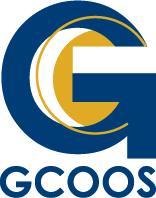 GCOOS' annual Members meeting is scheduled for March 23 at Le Pavillon hotel in New Orleans. We welcome GCOOS members as well as non-members interested in learning about our mission and programs to join us for this one-day meeting. GCOOS' annual Members meeting is scheduled for March 23 at Le Pavillon hotel in New Orleans. We welcome GCOOS members as well as non-members interested in learning about our mission and programs to join us for this one-day meeting.
Attendees will have the opportunity to hear updates on GCOOS activities from staff and sub-award recipients. We will also welcome representatives from partner organizations in the Gulf, including the U.S. IOOS Program Office, the IOOS Association and the National Academies of Science Gulf Research Program.
Dr. William Burnett, Deputy Commander and Technical Director to the Commander,
Navy Meteorology and Oceanography Command, will provide us with an operational demonstration of gliders in the Gulf.
The meeting begins with registration/light breakfast from 8:30 a.m. to 9 a.m. Lunch is provided at 12:15 p.m. and the afternoon program reconvenes at 1:15 p.m. The meeting wraps up around 5:30 p.m.
Lunch is on us, but we request you register your attendance no later than March 10 so that we may plan accordingly.
|
GCOOS was pleased to help sponsor the recent Gulf of Mexico Oil Spill & Ecosystem Science Conference Feb. 6-7 in New Orleans. The fifth annual conference
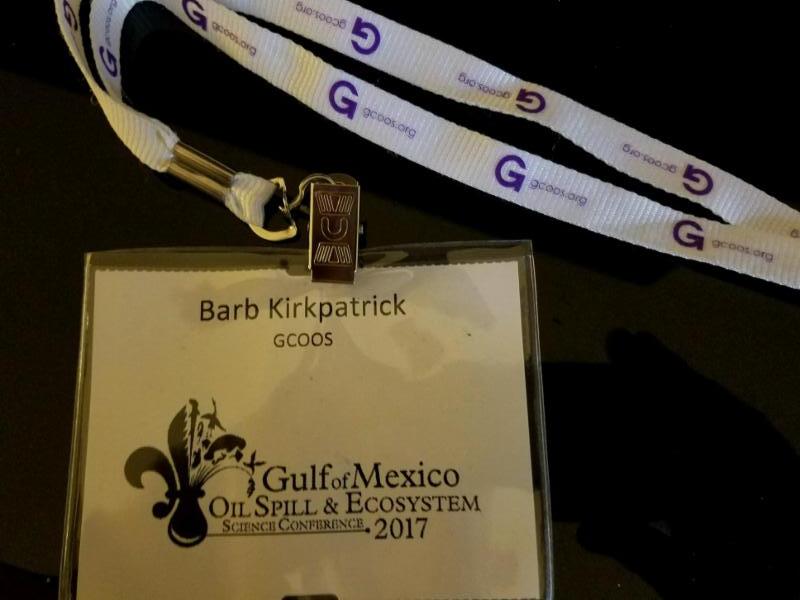 brought together hundreds of oil spill-related experts from academia, state & federal agencies, non-governmental organizations and industry to share the latest oil spill and scientific ecosystem discoveries, innovations, technologies and policies under the theme "Ecosystem Approaches to Gulf Response and Restoration."
Several GCOOS board members and staff participated in workshops and panel discussions, and conference participants focused on applications and practical uses of scientific research in the Gulf of Mexico.
Howard was also a speaker for The Gulf of Mexico
Tools Café, which provided developers the ability to give interactive demonstrations of tools and served as a platform for collaborative discussions.
|
Privacy Solutions for Databases
|
 When we asked nearly 100 scientists working in the Gulf of Mexico to share their acoustic tagging data in a new GCOOS data portal being developed, they were skeptical that their data could be appropriately protected. When we asked nearly 100 scientists working in the Gulf of Mexico to share their acoustic tagging data in a new GCOOS data portal being developed, they were skeptical that their data could be appropriately protected.
But data sharing is at the heart of many of the programs that GCOOS collects and distributes data for, so we needed a workable solution.
After investigating several options -- and even trying to create our own authentication solution -- developer Bob Currier found Stormpath, which interfaced seamlessly with Python API and gave the scientists the assurances they needed that they could control how widely their data would be shared.
|
Florida Students Learn About Biodiversity and Climate
|
In January and February, students at two elementary schools in Pinellas County learned about coral reef biodiversity and climate by engaging in a new four-week series of activities developed by Chris Simoniello, MBON GCOOS outreach lead.
Using a "Waters of the World" theme, she pilot-tested the lessons, drawing
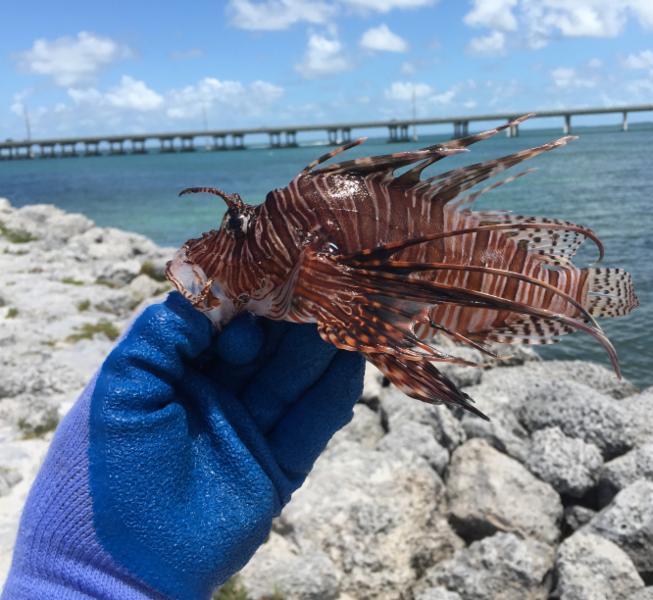 information and resources from the MBON project and a NOAA Climate Stewards Program grant. Simoniello used a multi-level approach to leverage resources and actively engage educators, teaching one class each week to gifted fifth grade students at Bay Point Elementary. The teacher observed the sessions and how the children responded. Then, Simoniello and the teacher adapted the content for grades K-4. The teacher also shared the program with the gifted lead at Gulf Beaches Elementary School. Combined, approximately 150 students participated in the lessons.
The Coral Reef project included multiple hands-on activities starting with a "sweet" ice-breaker in which the students created a coral reef made from cake. In the second week, the focus was on coral taxonomy. Students learned about the differences among large taxonomic groups and how healthy reef systems protect the coast. In Week 3, she reviewed habitats, biodiversity and resources linked to coral reef habitats, and developed an invasive species game. In Week 4, the students learned about how the impacts of global change are effecting deep water and shallow reef systems, and other natural and human-caused stressors. The materials will be uploaded to MBON and GCOOS websites in April so they can be used in classrooms throughout the Gulf.
|
|
Scientific Synthesis Training
|
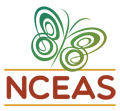 The Gulf Research Program is sponsoring a summer training session in scientific synthesis offered by the National Center for Ecological Analysis (NCEAS), DataONE and Data Carpentry. The Gulf Research Program is sponsoring a summer training session in scientific synthesis offered by the National Center for Ecological Analysis (NCEAS), DataONE and Data Carpentry.
The deadline to apply is TODAY, Feb. 17.
The three-week training "The Open Science for Synthesis: Gulf Research Program" is a hands-on data science course focusing on techniques for data management, scientific programming, synthetic analysis and collaboration through the use of open-source, community-supported tools.
Travel support and accommodation is provided. The funding for this project is provided by a grant from the Gulf Research Program, dedicated to improving understanding of the Gulf of Mexico's human, environmental, and energy systems in response to the Deepwater Horizon oil spill.
|
|
GOMA All-Hands Meeting Updates
|
The 2017 Gulf of Mexico Alliance All-Hands Meeting (following the Harte Research Institute's
One Gulf Summit) is just weeks away, with meeting and hotel registration deadlines
 looming. GCOOS is a meeting sponsor.
In an effort to address new initiatives, GOMA has set aside time to address the following Cross-Team Initiatives, which are issues with multiple Priority Issue Team collaboration and each has opportunities to address actions from different approaches. The Teams leverage their expertise and resources beyond their own issues to produce results.
These are the 2017 initiatives:
- Ecosystem Services: Advancing the identification, measurement and communication of coastal and marine ecosystem goods and services for better management of regional resources and to build resilient communities.
- Marine Debris: This new issue for the Alliance is a hot topic across many sectors; the goal is to assess, reduce, prevent and eliminate marine debris and aquatic trash in the Gulf and its watersheds.
- Conservation, Restoration, & Resilience Planning: Fostering greater integration of restoration, conservation and resiliency to increase the efficiency and effectiveness of on the ground efforts.
Hotel registration deadline, March 3. Register now
|
|
Water Quality Monitoring in Galveston Bay
|
The Galveston Bay Foundation has a Water Monitoring Team of trained volunteers who conduct water quality sampling at locations around Galveston Bay on an (at least)
 monthly basis. Their work, which augments professional data collection, shows trends for each sampling site and provides information needed in educational programs and decision-making.
The data are uploaded to the
GCOOS citizen science data portal developed by Dr. Shinichi Kobara, GCOOS Assistant Research Scientist and Product Developer, which showcases the work of citizen scientists and allows data sharing about water quality parameters in the Gulf's coastal regions.
The Foundation recently released its 2016 data summary of 444 samples collected from 51 sites around Galveston Bay.
|
Dispatches from the Gulf Features Dauphin Island Sea Lab
|
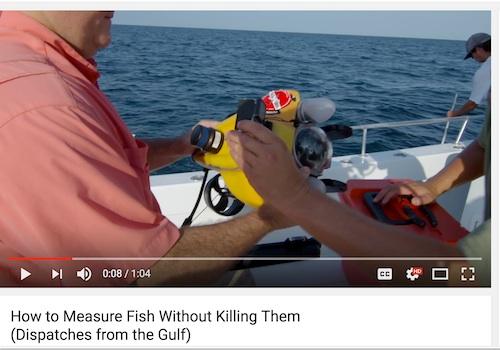
Will Patterson and Joe Tarnecki of the Dauphin Island Sea Lab are featured in a recent edition of
"Dispatches from the Gulf," which showcases how scientists confront the challenges of the Deepwater Horizon oil spill.
The project is supported by the Gulf of Mexico Research Initiative (GOMRI). Patterson and Tarnecki show how they use ROVs to estimate fish populations on Gulf reefs.
|
Restoration Funding Calendar
- NOAA RESTORE Act Science Program hosts a three-year calendar that consolidates planned funding opportunities
By State:
|
The Marine Biodiversity Observation Network
|
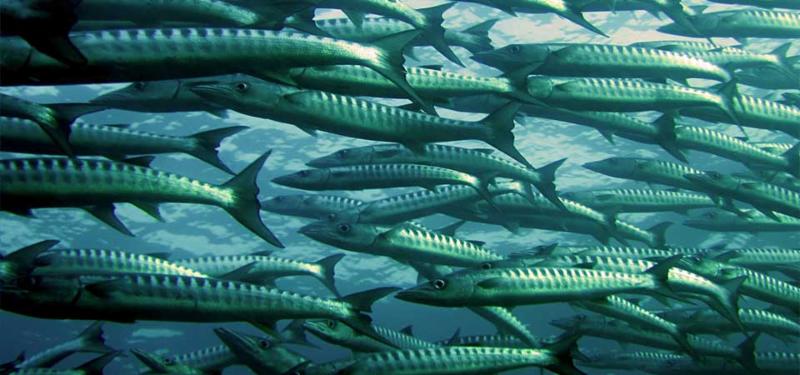 A new NOS/NOAA podcast and web story are gaining attention for MBON, the Marine Biodiversity Observation Network, and how it is growing nationwide. A new NOS/NOAA podcast and web story are gaining attention for MBON, the Marine Biodiversity Observation Network, and how it is growing nationwide.
MBON projects integrate independent historical and current biological and ecological surveys and databases with biodiversity indices and add in new observations to provide comprehensive data sets. By combining these data into a comprehensive system, resource managers can gain a better understanding of changes in ocean ecosystems and species over time.
|
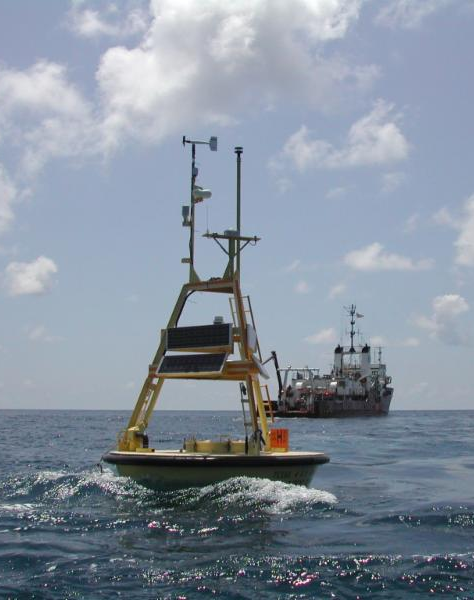
The National Ocean Service and the National Weather Service have released a new report "The National Strategy for a Sustained Network of Coastal Moorings," a focused effort by NOAA and non-Federal partners to define a framework for the planning and implementation of a sustained network of coastal moorings in U.S. waters.
Moorings are a vital
ocean-observing platform and, when buoys have been de-funded or removed, gaps have been created in local observing networks and led to public outcry. This report in response is designed to identify a core network and stakeholder needs and use available resources efficiently and effectively to keep the moorings and their sensors active.
|
|
Texas A&M University College of Geosciences invites inquiries, nominations and applications for Dean of the College of Geosciences.
TAMUS is seeking a distinguished, innovative scientist and leader who will collaborate with members of the College to develop and promote a vision that advances new understandings of the Earth System and prepares the next generation of geoscientists. The new Dean will be responsible for advancing the academic and financial well-being of the College, which excels in fundamental and applied research essential to solving some of society's greatest challenges-climate change, air and water quality, and adequate energy and water supplies-throughout Texas, the United States and globally.
Inquiries, nominations and candidate materials, including a CV and cover letter describing professional background and qualifications, can be sent in confidence to consultants Brian Bloomfield and Suzanne Teer via email to
[email protected]. The position will remain open until filled, but for fullest consideration candidate materials should be received by March 1, 2017.
|
The Central and Northern California Ocean Observing System (CeNCOOS) is seeking a creative and entrepreneurial Director to lead the collaborative and chart a path for a sustainable future. CeNCOOS is one of three west coast ocean observing collaborations.
The CeNCOOS program office is hosted by the Monterey Bay Aquarium Research Institute (MBARI) in Moss Landing, California, and the Director is an employee of MBARI. Annual reviews are conducted by the host institution with input from the CeNCOOS Governing Council. Salary commensurate with experience. MBARI offers a generous benefits package.
|
Mississippi-Alabama Sea Grant Consortium
|
The University of Alabama is seeking qualified applicants for the position of National Extension Liaison as part of a growing effort for collaboration between the National Oceanic and Atmospheric Administration's (NOAA) National Weather Service and NOAA Sea Grant. The liaison will be located at the National Water Center (NWC) on the campus of the University of Alabama in Tuscaloosa.
The candidate will develop an outreach program grounded in NWC priorities, related research and the needs of target audiences and also engage with the NWC and the Sea Grant Extension Assembly.
|
Early-Career Research Fellowship, Gulf Research Program
|
Early-career research fellowships support emerging scientists as they take risks on research ideas not yet tested, pursue unique collaborations and build a network of colleagues who share their interest in preventing oil spills and in the well-being of coastal communities and ecosystems.
These two-year fellowships are awarded to tenure-track faculty (or equivalent) at colleges, universities, and research institutions. Because the pre-tenure phase of a researcher's career is a critical time, the unrestricted funds and mentoring this fellowship provides help recipients navigate this period with independence, flexibility, and a built-in support network.
- Deadline: 5 p.m. EST Feb. 22
- More
|
Science Policy Fellowship, Gulf Research Program
|
The science policy fellowship program helps early-career scientists hone their skills by putting them to practice for the benefit of Gulf Coast communities and ecosystems. Fellows gain first-hand policy-making experience as they spend a year on the staff of federal or state environmental, natural resource, oil and gas, or public health agencies in the Gulf of Mexico region.
- Deadline: 5 p.m. EST Feb. 22
- More
|
|
U.S. IOOS Ocean Technology Transition Federal Funding Opportunity
|
| The U.S. IOOS Program is seeking to fund projects that advance new or existing technology-based solutions that address long standing and emerging coastal observing, product development, and data management challenges.
|
NOAA Coastal Resilience Grants Federal Funding Opportunity
|
The NOAA Coastal Resilience Grants FFO will fund projects that build resilience, including activities that protect life and property, safeguard people and infrastructure, strengthen the economy, or conserve and restore coastal and marine resources.
- Deadline is March 15, 2017.
- More
|
2017
ASLO Aquatic Sciences Meeting,
February 26-March 3, 2017. Honolulu, HI.
March
Radiowave Operators Working Group Meeting (ROWG) is scheduled for March 13-14, 2017 at TAMU-Galveston. CODAR will also hold a user group meeting on March 15 in Galveston.
State of the Gulf Summit, March 26-28, 2017. Houston, TX. The Summit if followed by a
GOMA all-hands meeting from March 29-30.
International Research Needs Meeting hosted by BOEM, HRI, GRP and NOAA, March 29-30, 2017, Houston, TX. Invitation-only.
May
3rd Blue Planet Symposium: Dates have changed
The Symposium will serve as a forum for discussion of societal information needs resulting from the important role the ocean plays in Earth's life-support system and the challenge of minimizing the impacts of human activities on the oceans while utilizing the resources of the oceans to meet our needs.
- Details
- College Park, MD, May31-June 2, 2017
Gulf of Mexico Climate Community of Practice Annual Meeting, bringing together extension, outreach and education professionals with community officials in the Gulf to learn how coastal communities can adapt to sea-level rise, precipitation changes and other climate-related issues. May 16-18, 2017, Covington, Louisiana
Other Gulf-Related Events
Have a meeting, job or funding announcement? Please email details to Laura Caldwell at GCOOS.
|
|
|
|
|